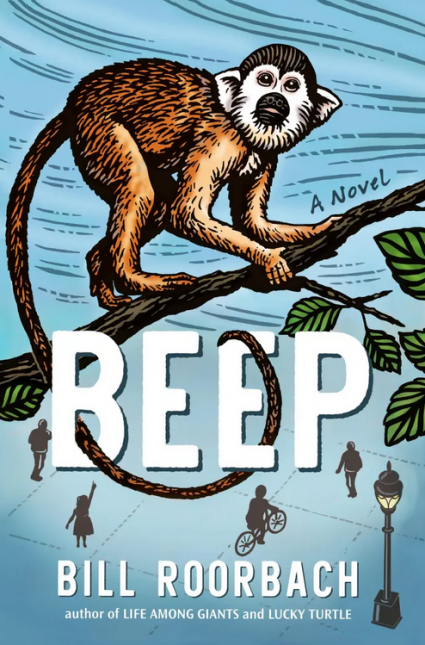A precocious monkey has a lot to say about us humans.

Often, in moments that feel particularly silly or absurd, I find myself wondering what aliens looking down would make of us here on Earth — how would they perceive, say, a kickboxing class, or a dentist’s visit, or a NASCAR race? In Beep, Bill Roorbach gives us an equally foreign perspective: humans viewed through the lens of an inquisitive squirrel monkey named Beep.
He begins his odyssey in Costa Rica, “the world of monkeys near saltwater on the sunset side of the vast beyond,” where Beep lives with his tribe. Growing into adolescence, he begins to feel restless and determines to seek out a mate from a different tribe, hoping to reunite the two after a split many generations ago.
In Roorbach’s capable hands, Beep’s speech becomes an intelligible and pleasingly simple amalgam of human words, such as when he reflects on his journey thus far:
“I lingered in the fig, watched the good world a long time, those hills so promising but so far away, a kind of haze that made it all seem to fade and fade again, the greens going lighter, the blue of the sky lighter, too, till it was all one thing: destiny.”
Before long, however, Beep’s adventure is curtailed when he comes into contact with a kind girl, Inga. He believes he’s communicated that he needs help on his mission and that she understands him; instead, when he goes willingly with her, she takes him on a “roarbird” to her own home, New York City.
In Manhattan, Beep tries to make sense of a new environment unlike anything he’s ever seen. When Inga walks him past a zoo, “I was distracted by a crazy huge white animal emerging from some neighboring rock,” he observes, “shifting from paw to paw, groaning and muttering, ‘I am Polar Bear, once great, once fearsome. I am Polar Bear, miles did I roam. I am Polar Bear, once great, once fearsome.’”
When Inga and her schoolmates attend a presentation by Greta Thunberg, Beep tags along and recognizes in the environmental activist a kindred spirit:
“The enormous Greta-ish face glowing on the cavern wall remained impassive, then slowly brightened. Impish, eyes so alive, and I suddenly saw it: she was a monkey. Greta was a monkey!”
Inspired by Greta’s passion, Beep and Inga make their way to the “Bronzoo,” “a prison for animals across the genera, including (more or less) the you-mens who worked there.” Moving quickly, they free as many creatures as they can, relying on the zookeepers’ fear and Inga’s lack thereof.
Animals that would’ve been enemies in the wild forge a truce in the name of helping Beep find a mate — still his ultimate goal — and take a united stand against the humans trying to force them back into their enclosures:
“‘Go, go!’ the lemmings chorused, watching over the flood of animality that pushed through the liberated gaytz, correcting the course of a band of blind Afriggan moles, assigning them guides among rare Ruritanian rabbits, offering advice to aardvarks, pep talks for penquins, honor for ostriches.”
Beep is finally able to connect with a female of his species, Deeps, and begins the trip home on a “shubble buzz” with two friendly, conspiring “Beaut-ist” monks. As they travel, they start to discuss a prophecy, brought about by monkeys, that it is said will result in the death of most humans.
This prophecy thread is the only part of the book that feels a bit tacked-on, as though Roorbach thought higher stakes were needed at the end of the story. But it’s hard to imagine Beep, who’s grown to care for Inga and other people, doing anything to hasten their destruction. That aside, Beep brims with hilarity, kindness, and humor and is a great choice for lovers of tall tales, animals, or both.
Mariko Hewer is a freelance editor and writer. She is passionate about good books, good food, and good company. Find her occasional insights at @hapahaiku.

